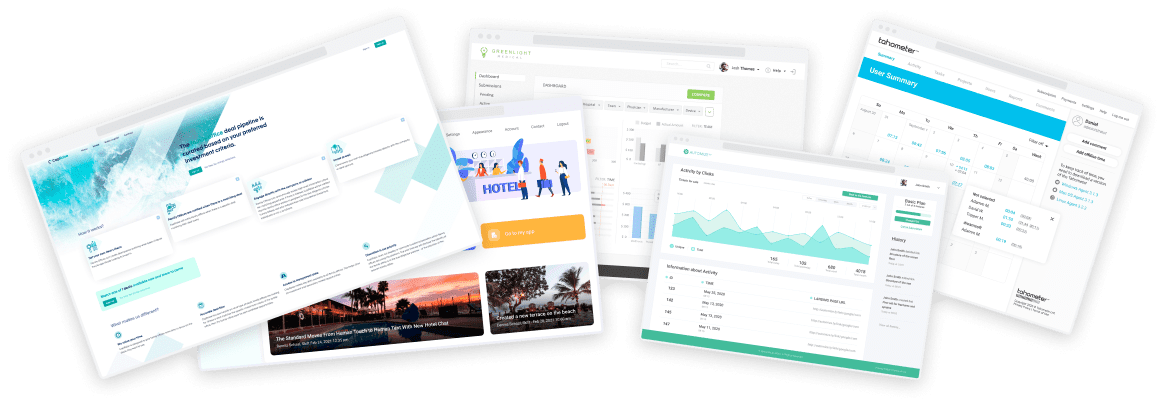Real Estate Web Development Services
Real estate web development services provide the technical foundation for digitising complex property operations, from automated listings to integrated CRM and MLS systems. By aligning business workflows with scalable web architectures, these solutions enable real-time data synchronisation, enhanced user engagement, and greater operational efficiency. Our software development expertise ensures each solution is robust, future-ready, and aligned with industry best practices. Our approach focuses on modular, API-driven platforms that support custom business logic, secure data handling, and seamless third-party integrations. Tailored for estate agencies, property management firms, and PropTech ventures, each solution is built to meet specific commercial objectives.

Our Real Estate Web Development Expertise
With deep industry insight and technical proficiency, we deliver web-based solutions tailored to the operational needs of the real estate sector. Our expertise spans the development of property listing platforms, tenant and landlord portals, booking and viewing systems, and custom CMS solutions. We build systems that integrate seamlessly with CRM platforms, MLS/IDX feeds, payment gateways, and geolocation services—ensuring data accuracy, performance, and scalability. Whether supporting residential sales, lettings, or commercial property management, our solutions are designed to enhance user experience, optimise internal workflows, and align with your business goals.
Property Listing Websites
Real Estate Marketplaces
Tenant & Landlord Portals
Analytics & Reporting Dashboards
CRM Integration
Booking & Viewing Systems
Custom CMS for Real Estate
API Development
Looking for Real Estate Web Development Services in the UK?
Who We Work With
We collaborate with a broad range of clients across the property sector, each with distinct operational challenges and digital priorities. Our partners include estate agencies seeking modern, user-friendly listing platforms; property management firms in need of automated tenant and maintenance systems; and PropTech startups developing innovative, data-driven products. We also support commercial developers and lettings companies looking to streamline operations, enhance client engagement, and integrate with third-party services. Regardless of scale or complexity, we tailor each solution to meet specific industry demands.
Real estate agencies
Commercial & residential developers
PropTech startups
Lettings and leasing companies
Property management firms
Business Benefits for Real Estate Companies
Custom real estate web development offers measurable advantages across operational, commercial and customer-facing domains. Automated workflows reduce manual effort and administrative overhead, while tailored user interfaces improve engagement for buyers, tenants and agents. Integrated platforms enable real-time data access, multi-channel communication, and seamless synchronisation with third-party systems such as CRMs and payment providers. Most importantly, bespoke solutions ensure alignment with your unique business model, providing scalability, competitive differentiation, and long-term return on investment.
Operational efficiency through automation
Increased conversion and lead capture
Real-time data synchronisation and scalability
Full control over business logic and workflows
Enhanced UX for buyers, sellers and agents
Competitive advantage in a fast-evolving market
Supporting Technologies
Software Planet work across the entire tech stack and offer our clients diverse expertise, covering the below listed technologies and more.
Java
Ruby on Rails
Vue/Vuex
Python
Angular/NgRX
React/Redux
.Net
GraphQL
SQL
Node
Rest
NoSQL
Our Approach to Real Estate Application Development
Our development process is grounded in a clear understanding of real estate operations, user expectations, and industry-specific compliance. We follow a modular, API-first architecture that allows for seamless integration with CRMs, MLS platforms, payment gateways, and property databases. Each solution is designed with scalability, performance, and data security in mind—ensuring it grows alongside your business. Through agile delivery, cross-functional collaboration, and continuous testing, we ensure your application meets both technical standards and commercial goals.
Data Security
Real estate platforms manage highly sensitive data, including identification documents, tenancy agreements, financial transactions, and personal communications. To protect this information, we implement robust security measures such as end-to-end encryption, secure user authentication, role-based access controls, and audit logging. Our development lifecycle incorporates regular vulnerability assessments and penetration testing to ensure all applications remain resilient against cyber threats.
Compliance Standards
Our solutions are fully aligned with UK and EU regulatory frameworks, including GDPR, the UK Data Protection Act, and, where relevant, AML (Anti-Money Laundering) and KYC (Know Your Customer) requirements. We work closely with legal and compliance teams to ensure that data collection, processing, and storage meet current legal standards. Features such as user consent management, data minimisation, and access transparency are built directly into the system architecture.
Want to know how these technologies can power Your project?
Contact us to discuss how we can customise a solution for your business.
Clients from SMEs to Fortune 500 Companies
There is never a silver bullet when it comes to serving customers. Our success is the direct result of working hard to find the right approach for every one of our specific partners.
What Our Clients Say
What are the Next Steps?
If you require bespoke web development services or want want to augment your current team’s capabilities, the process is straightforward:
1. Book a Call
2. Get an Offer
3. Make Your Decision
Real Estate Web Development FAQs
How can a custom real estate web platform ensure data synchronisation across multiple listing services (MLS) in real time?
Synchronising data across multiple MLS providers requires more than just API calls — it demands a robust middleware layer capable of handling inconsistent data schemas, asynchronous updates, and rate-limited endpoints. A well-designed system leverages a queue-based architecture (e.g. using Kafka or RabbitMQ) and automated conflict resolution to ensure listings remain consistent, even when updates originate from various third-party sources.
What architectural patterns are best suited for scaling a high-traffic real estate marketplace?
For real estate marketplaces expecting high concurrent traffic, a microservices architecture is often the most scalable approach. It enables independent scaling of key services such as search, user profiles, booking systems, and media storage. Additionally, implementing CDNs for image-heavy content, search engine indexing layers (e.g. ElasticSearch), and container orchestration (e.g. Kubernetes) ensures performance under load and resilience across regions.
How can we optimise property search functionality without compromising performance or UX?
Advanced property search involves complex queries with filters, geolocation, and full-text search. To maintain performance, we typically decouple the search layer from the main application using technologies like ElasticSearch or Algolia, which support faceted search, synonyms, and typo tolerance. Combined with server-side rendering (SSR) for SEO and intelligent prefetching on the frontend, this ensures a fast and responsive user experience even with millions of listings.
How do you approach regulatory compliance (e.g. GDPR, CCPA) in web platforms that process tenant and landlord data?
Compliance is embedded into the system architecture from day one. This includes granular access controls, audit trails, and automated data retention policies. Personally identifiable information (PII) is encrypted at rest and in transit, while consent mechanisms are integrated into user flows. For GDPR, we implement data portability features and deletion workflows via secure APIs, ensuring full alignment with legal requirements across jurisdictions.
What role does API orchestration play in integrating third-party services like payments, credit checks, and digital signatures?
In complex real estate platforms, API orchestration acts as the glue between internal systems and external service providers. Instead of point-to-point integrations, we use an API gateway combined with an orchestration layer (e.g. using GraphQL or BFF pattern) to manage dependencies, fallback mechanisms, and data transformations. This approach not only improves maintainability but also enhances resilience and observability across services such as Stripe, Plaid, DocuSign, and identity verification APIs.
